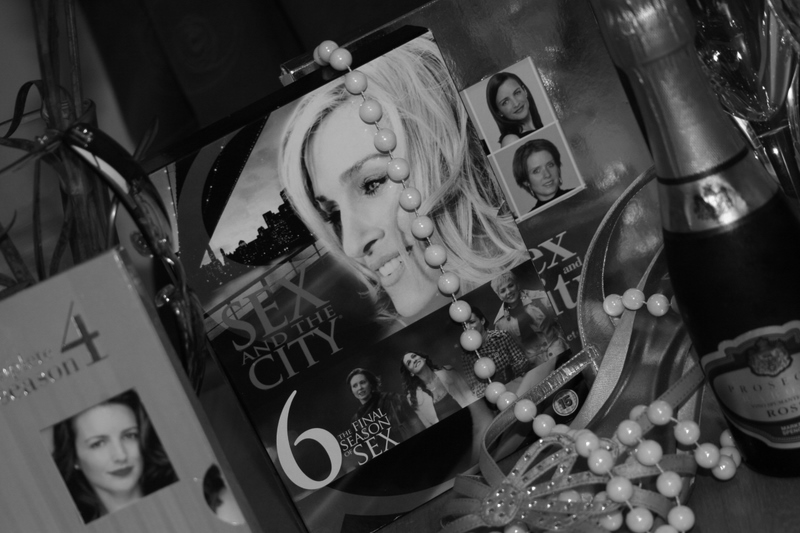I couldn’t help but wonder… Was “Sex and the City” influencing me to keep things from my partner in crucial moments? This hit comedy show from the late 90’s/early 2000’s centers its narrative on three single, then not single, then single again women in New York. Each episode traditionally spends the majority of its time depicting a difficulty one or all of the central characters are having with a man (or men) in their lives. What usually follows these crucial moments of relationship conflict is a round table discussion where all the girls present opinions and advice, the likes of which are often biased, over a plate of Manhattan delights. I am one of the openly gay males who openly gay show creator Darren Star successfully reached with his glittery material. I love the show, and I applaud its celebration of female friendship. The value it places on their ability to share with each other about their lives in a judgment-free space is heartwarming and empowering to many who have found a chosen family.

The girls vacay together in “Sex and the City 2” (2010)
However, I think there is an element of these roundtable discussions that warrants closer inspection. While this is admittedly quite overarching, generally the women make up their minds about how best to approach their problems by the end of the meal. Let’s set the stage with an example from season one. In the fourth episode of this show entitled “Valley of the Twenty-Something Guys” (1998), Kristin Davis’ character Charlotte is worried that her boyfriend will dump her if she doesn’t let him perform anal sex on her WASPosterior. Upon hearing about the situation, Carrie, being the show glue that she is, immediately drops her plans and calls an emergency meeting between the four core friends. This time in a cab, everyone has a unique take on things. Miranda, being the cynical one of the group, suggests that there will be an imbalance of power if she allows the erotic activity to occur. Samantha, ever the sexual pioneer, suggests that the body is designed to experience anal sex. I’m not sure if these suggestions helped Charlotte or contributed to her anxiety over the hole thing, but something certainly missing is any scene where she either expresses these concerns to her boyfriend or said dude actually attempts to help her feel more comfortable with it.

One of the many box sets of “Sex and the City” currently available
Let me be clear. There’s nothing wrong with the scene I mentioned above. It’s comical, if somewhat dated, and we see every character be the best gal pal she can be. More so than romantic love, gal pal-ing is what the show is truly about. However, I wouldn’t say these people are portraits of clear communication in their love lives. It wasn’t really the show’s responsibility to make them thus, but if we are to believe the thesis of SATC is to actualize independent women, then we should talk about why few of the characters work things out with their partners.
Let’s generalize for a moment. Most of the characters on the show do from time to time, so why not? Carrie Bradshaw, the predominant poster child for female agency liberation on TV at the time of the show’s peak popularity, is possibly the worst offender when it comes to not speaking their mind. Time and time again, especially in relation to her central love interest, charismatic tycoon Mr. Big (Chris Noth), Carrie withholds her feelings. In moments of doubt or self-sabotage, Carrie usually internalizes her pain before shirking it off with a clever witticism or reacting with an outburst. What she usually does next is, you guessed it, explain the problem to all her friends or write about it. There’s simply a step missing here, Carrie.
Now, if the show is meant to depict a character with a very specific avoidant attachment style, and I would never claim to be qualified to diagnose such a personality trait, then that makes more sound creative sense to me. Having a character struggle to express their feelings when they feel them is a fine thing. It’s great actually! I find myself struggling to risk rejection in moments of conflict every week. Dare I say every day? I’m only unsure how aware the show is of this. Certainly each main character (although possibly still not Carrie) finds better connected and communicative relationships as the show progresses. There is growth to behold, but when Carrie ends up with Mr. Big in the show’s final episode because of a grand romantic gesture instead of them working out their emotional unavailability in therapy, I’m left slightly skeptical.

Who is gonna do this with me??
My point is that the girls on the show reach a level of vulnerability with their best friends that they just don’t with their romantic interests. True, this seems entirely in line with what the show is trying to say. At one point Charlotte even suggests that they could be each other’s soul mates and guys should just be for fun. I applaud this, but the follow-through leaves a little to be desired. The girls seek validation, understanding, intimacy, truth, and depth from their lovers at the show’s beginning and at its end. I promise, I also applaud this. I’m merely bewildered.
The show is legendary and still worth celebrating. What I think I wanted was for the characters to take a little more responsibility for healing their relationships in moments of damage and specifically with the people they share that relationship with. This is so crucial for healthy companionship which can, by the way, come from friends or lovers or both. Shouldn’t we strive for relationships where we can talk to our significant other about what’s bothering us? Shouldn’t a show’s depicted characters who can’t or don’t indicate that clearly with some knowingly creative or artistic angle? All I can say is, I couldn’t help but wonder…